英语口语之电子书与纸质书
英语对话——电子书与纸质书的差异
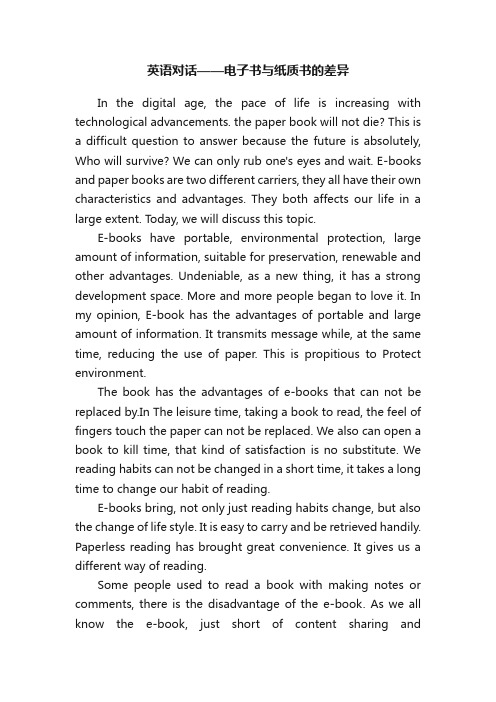
英语对话——电子书与纸质书的差异In the digital age, the pace of life is increasing with technological advancements. the paper book will not die? This is a difficult question to answer because the future is absolutely, Who will survive? We can only rub one's eyes and wait. E-books and paper books are two different carriers, they all have their own characteristics and advantages. They both affects our life in a large extent. Today, we will discuss this topic.E-books have portable, environmental protection, large amount of information, suitable for preservation, renewable and other advantages. Undeniable, as a new thing, it has a strong development space. More and more people began to love it. In my opinion, E-book has the advantages of portable and large amount of information. It transmits message while, at the same time, reducing the use of paper. This is propitious to Protect environment.The book has the advantages of e-books that can not be replaced by.In The leisure time, taking a book to read, the feel of fingers touch the paper can not be replaced. We also can open a book to kill time, that kind of satisfaction is no substitute. We reading habits can not be changed in a short time, it takes a long time to change our habit of reading.E-books bring, not only just reading habits change, but also the change of life style. It is easy to carry and be retrieved handily. Paperless reading has brought great convenience. It gives us a different way of reading.Some people used to read a book with making notes or comments, there is the disadvantage of the e-book. As we all know the e-book, just short of content sharing andunderstanding of information, after reading it out, unlike paper books are worth keeping.In the age of rapid development of science and technology, people's life has suffered a great impact. There has been some question as to whether or not the traditional way of reading will not be upset? What e-books can bring into our culture industry, How to treat the paperless reading?This is all we need to think about.。
英语口语之电子书与纸质书
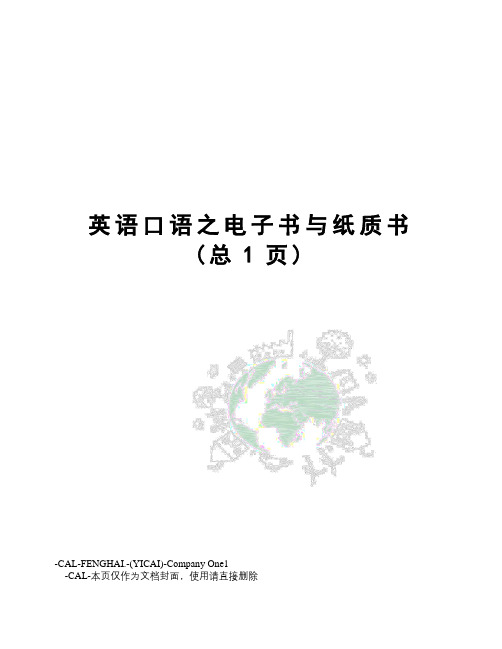
英语口语之电子书与纸质书(总1页)-CAL-FENGHAI.-(YICAI)-Company One1-CAL-本页仅作为文档封面,使用请直接删除Nowadays, we often see people read books on the phone or the reader like kindle,rather than read the paper book. WhyThe answer is the internet technology.With the development of internet technology, people’s reading habit has changed a lot. For example, there are so many books and articles in electronic form on the internet,we can read them on the web page. We can download the articles and the materials that we need from the Internet onto our personal computer or smart phone, that’s to say, we can more easily get information from all over the world anywhere, anytime with internet. In addition, reading with internet technology can save more papers. What’s more, we can read books with the special reader, such as kindle. On the one hand, we can download so many books and articles for free from kindle. On the other hand, the design of the kindle is more in line with the texture of the paper book, which helps protect our eyes. As whole, the biggest change of people’s reading habit, which is led by the internet technology, is the electronic reading.Indeed, the internet technology makes our reading more convenient, more economical, even more environmentally friendly. So,some people believe that e-books will replace paper books in the future, but I don’t agree with it. Even if the e-book has a lot of advantages paper books do not have, paper books have the advantage that e-books cannot go beyond. For instance, when people want to read atheoretical and professional book, the paper book will be better. And paper book has a unique texture, that e-books have not. The most important is that some people have a special feeling for paper books like me. I read not only e-books but also paper books. Both are part of my real life, they cannot replace each other.2。
书本和电子书比较作文英语
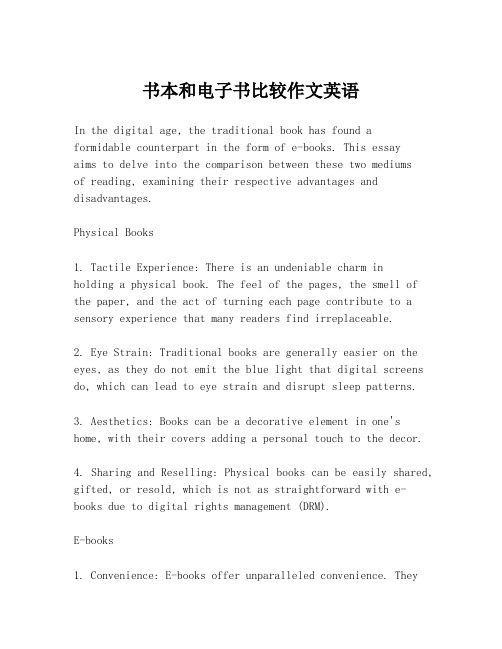
书本和电子书比较作文英语In the digital age, the traditional book has found aformidable counterpart in the form of e-books. This essayaims to delve into the comparison between these two mediumsof reading, examining their respective advantages and disadvantages.Physical Books1. Tactile Experience: There is an undeniable charm inholding a physical book. The feel of the pages, the smell of the paper, and the act of turning each page contribute to a sensory experience that many readers find irreplaceable.2. Eye Strain: Traditional books are generally easier on the eyes, as they do not emit the blue light that digital screens do, which can lead to eye strain and disrupt sleep patterns.3. Aesthetics: Books can be a decorative element in one's home, with their covers adding a personal touch to the decor.4. Sharing and Reselling: Physical books can be easily shared, gifted, or resold, which is not as straightforward with e-books due to digital rights management (DRM).E-books1. Convenience: E-books offer unparalleled convenience. Theycan be stored on a single device, allowing readers to carry an entire library with them wherever they go.2. Accessibility: For individuals with visual impairments, e-books can be adjusted for font size and type, and can be read aloud by screen readers, making them more accessible.3. Cost: E-books are often less expensive than their physical counterparts, as they eliminate the costs associated with printing and shipping.4. Instant Access: Once purchased, e-books can be downloaded instantly, eliminating the wait time for physical delivery.Environmental ImpactWhile e-books have the potential to be more environmentally friendly due to the lack of physical materials and transportation, the production and disposal of electronic devices used to read them must also be considered.ConclusionThe choice between books and e-books is a personal one, influenced by factors such as preference for the reading experience, convenience, cost, and environmental considerations. As technology continues to evolve, it is likely that e-books will become more sophisticated, potentially bridging the gap between the traditional and digital reading experiences. However, the tactile and sensory appeal of physical books is unlikely to be fully replicatedby any digital medium. Ultimately, both formats have their place in the world of literature, catering to different needs and preferences of readers.。
英语作文电子书和纸书

英语作文电子书和纸书Electronic books and paper books have their own unique qualities and uses in today's world. Let's talk about the pros of electronic books first.E-books are so convenient! You can carry a wholelibrary in your backpack or even your pocket. No more lugging around heavy books or running out of space on your shelves. Plus, with instant downloads and search functions, finding information is a breeze.But some people still prefer the old-fashioned paper books. There's something about the feel of a real book that just can't be replicated on a screen. The smell of the pages, the weight of it in your hands, it's just more...tangible, you know?Then there's the issue of eye strain. Staring at a screen for hours can be tough on your eyes. Paper books are easier on the eyes, making them a better choice for longreading sessions.Electronic books also have the benefit of being easily adjustable. You can change the font size, brightness, and even the background color to suit your reading preferences. This is especially helpful for people with visual impairments.But let's not forget about。
电子书籍与传统纸质书的比较英语作文范文

电子书籍与传统纸质书的比较英语作文范文In today's digital age, the debate between electronic books (e-books) and traditional printed books has become increasingly relevant. Both formats offer unique advantages and cater to different preferences among readers. This essay examines the merits and drawbacks of each format and explores how they contribute to the reading experience in contemporary society.Firstly, e-books provide unparalleled convenience and accessibility. With a digital device such as a tablet, smartphone, or e-reader, readers can carry an entire library with them wherever they go. This portability eliminates the need for physical storage space and allows for instant access to a vast range of titles. Moreover, e-books often feature adjustable text sizes and built-in dictionaries, enhancing readability and comprehension for users.However, traditional printed books offer their own distinct pleasures. Many readers appreciate the tactile experience of holding a physical book, turning its pages, and feeling the weight of the volume in their hands. Printed books also appeal to those who value the sensory aspects of reading, such as the smell of ink on paper or the aesthetic quality of a well-designed book cover. Furthermore, printed books do not require batteries or electronic devices, making them reliable in situations where access to electricity or technology may be limited.Another consideration is the environmental impact of each format. E-books generally consume fewer natural resources in their production and distribution compared to printed books, which require paper, ink, and transportation. Digital books contribute to reducing deforestation and carbon emissions associated with traditional publishing processes. However, the manufacturing and disposal of electronic devices used forreading e-books can generate electronic waste, posing environmental challenges of its own.In terms of cost, e-books often provide a more economical option for readers, especially considering the lower production and distribution costs involved in digital publishing. Additionally, e-books can be instantly downloaded or purchased online, eliminating shipping fees and delivery times associated with printed books. On the other hand, while printed books may be more expensive to produce and purchase, they can be resold, shared, or borrowed from libraries, offering cost-saving opportunities and fostering community engagement among readers.Beyond practical considerations, both e-books and printed books play crucial roles in preserving and disseminating knowledge and culture. Printed books have a rich history of being cherished as artifacts and repositories of human thought and creativity. They hold sentimental value for manyindividuals and contribute to the cultural heritage of societies worldwide. In contrast, e-books facilitate the democratization of knowledge by providing access toliterature and educational resources to a global audience, including populations with limited access to physical books.In conclusion, the choice between e-books and traditional printed books ultimately depends on individual preferences, circumstances, and values. While e-books offer convenience, accessibility, and environmental benefits, printed books provide sensory satisfaction, cultural significance, and potential cost advantages. Both formats contribute uniquely to the reading experience and continue to coexist in arapidly evolving digital landscape. As technology advances and reader preferences evolve, the future of books may involve a harmonious integration of digital and traditional formats, ensuring diverse options for readers worldwide.。
电子书和纸质书英语作文
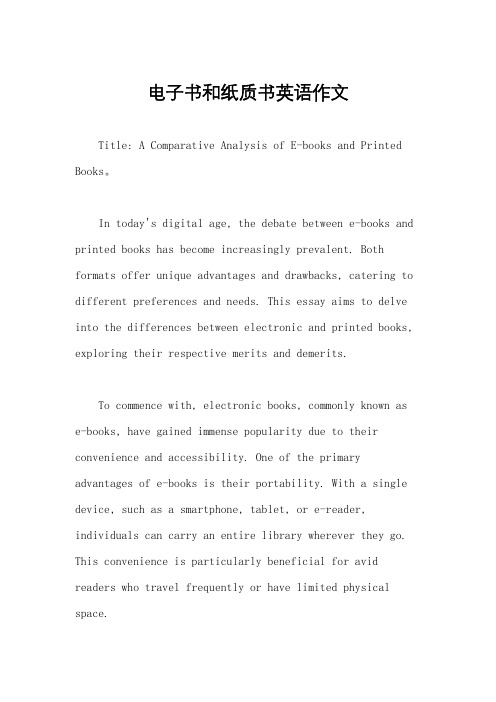
电子书和纸质书英语作文Title: A Comparative Analysis of E-books and Printed Books。
In today's digital age, the debate between e-books and printed books has become increasingly prevalent. Both formats offer unique advantages and drawbacks, catering to different preferences and needs. This essay aims to delve into the differences between electronic and printed books, exploring their respective merits and demerits.To commence with, electronic books, commonly known as e-books, have gained immense popularity due to their convenience and accessibility. One of the primary advantages of e-books is their portability. With a single device, such as a smartphone, tablet, or e-reader, individuals can carry an entire library wherever they go. This convenience is particularly beneficial for avid readers who travel frequently or have limited physical space.Moreover, e-books often provide additional featuresthat enhance the reading experience. For instance, readers can adjust font sizes, customize background colors, and utilize built-in dictionaries for instant definitions. Additionally, e-books may incorporate multimedia elements like audio narration and interactive graphics, offering a multi-sensory engagement that traditional books cannot match.Furthermore, e-books contribute to environmental sustainability by reducing paper consumption and carbon emissions associated with printing and transportation. With the increasing concern for ecological preservation, the digital format aligns with efforts to minimize waste and conserve resources.On the other hand, printed books offer a tangible and tactile experience that appeals to many readers. The sensory aspect of holding a physical book, feeling its pages, and inhaling the scent of paper and ink evokes a sense of nostalgia and intimacy. For some, this sensoryengagement enhances the emotional connection to the text and fosters a deeper appreciation for the reading experience.Additionally, printed books do not require electronic devices or batteries, making them accessible even in areas with limited electricity or internet connectivity. This accessibility is particularly crucial in regions where technological infrastructure is underdeveloped or unreliable.Moreover, printed books hold cultural and historical significance, serving as tangible artifacts of human knowledge and creativity. Libraries and bookstores, with their shelves lined with printed volumes, serve as communal spaces that foster intellectual exchange and collective learning. The physical presence of books contributes to the ambiance and character of these spaces, enriching the overall cultural landscape.However, printed books have inherent limitations compared to their electronic counterparts. They are bulkierand less portable, requiring dedicated storage space and careful handling to prevent damage. Additionally, printed books lack the customizable features of e-books, such as adjustable font sizes and search functions, which can be particularly beneficial for individuals with visual impairments or specific reading preferences.In conclusion, the choice between e-books and printed books ultimately depends on individual preferences, circumstances, and priorities. While e-books offer unparalleled convenience, customization, and environmental sustainability, printed books provide a sensory, cultural, and historical experience that resonates with many readers. Ultimately, both formats contribute to the rich tapestry of human literary expression, each offering its unique blend of advantages and charm. As technology continues to evolve, the coexistence of e-books and printed books ensures that readers can enjoy diverse reading experiences tailored to their needs and preferences.。
电子书与纸质版英语作文
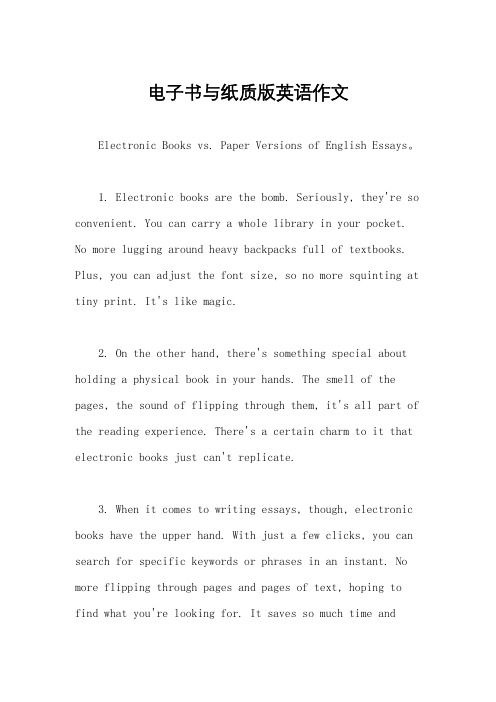
电子书与纸质版英语作文Electronic Books vs. Paper Versions of English Essays。
1. Electronic books are the bomb. Seriously, they're so convenient. You can carry a whole library in your pocket. No more lugging around heavy backpacks full of textbooks. Plus, you can adjust the font size, so no more squinting at tiny print. It's like magic.2. On the other hand, there's something special about holding a physical book in your hands. The smell of the pages, the sound of flipping through them, it's all part of the reading experience. There's a certain charm to it that electronic books just can't replicate.3. When it comes to writing essays, though, electronic books have the upper hand. With just a few clicks, you can search for specific keywords or phrases in an instant. No more flipping through pages and pages of text, hoping to find what you're looking for. It saves so much time andfrustration.4. But let's not forget about the joy of underlining and highlighting in a paper book. There's something satisfying about physically marking up the text, making it your own. It helps with comprehension and retention too.It's like having a conversation with the author, leaving your thoughts and reactions right there on the page.5. Another advantage of electronic books is the ability to access additional resources with just a tap. You can instantly look up definitions, translations, or evenrelated articles. It's like having a personal research assistant right at your fingertips. It's a game-changer for writing essays.6. However, there's a certain nostalgia associated with paper books. Remember the days of dog-earing pages and writing notes in the margins? It's a personal touch that electronic books can't replicate. It's like leaving a piece of yourself behind in the book, a little reminder of your journey through the text.7. In conclusion, both electronic books and paper versions have their pros and cons. Electronic books offer convenience, searchability, and access to additional resources. On the other hand, paper books provide a tactile experience, a sense of nostalgia, and the joy of marking up the text. So, whether you prefer the digital world or the traditional one, there's no denying that both have their place in the world of English essays. It's all aboutfinding what works best for you.。
电子书纸质书作文英语模板
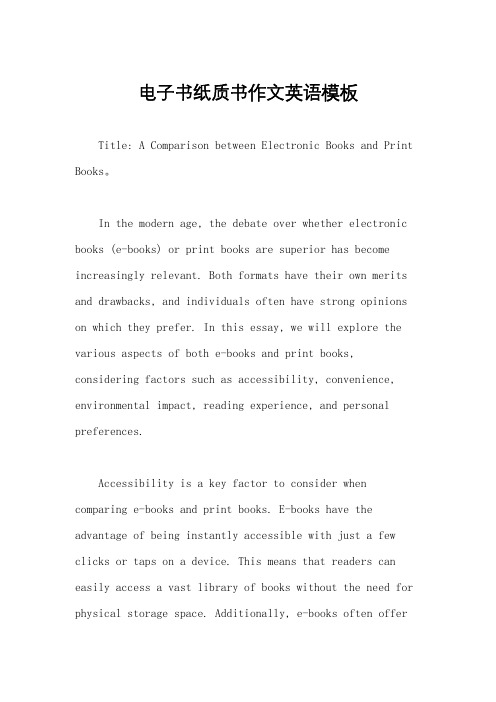
电子书纸质书作文英语模板Title: A Comparison between Electronic Books and Print Books。
In the modern age, the debate over whether electronic books (e-books) or print books are superior has become increasingly relevant. Both formats have their own merits and drawbacks, and individuals often have strong opinions on which they prefer. In this essay, we will explore the various aspects of both e-books and print books, considering factors such as accessibility, convenience, environmental impact, reading experience, and personal preferences.Accessibility is a key factor to consider when comparing e-books and print books. E-books have the advantage of being instantly accessible with just a few clicks or taps on a device. This means that readers can easily access a vast library of books without the need for physical storage space. Additionally, e-books often offerfeatures such as adjustable font sizes and built-in dictionaries, making them more accessible to individuals with visual impairments or those learning a new language.On the other hand, print books also have their own accessibility benefits. Unlike e-books, print books do not require access to electronic devices or an internet connection. They can be read anytime, anywhere, without worrying about battery life or screen glare. Furthermore, print books can be shared and borrowed easily, allowing for a sense of community among readers.Convenience is another important factor to consider. E-books are often praised for their convenience, as they allow readers to carry an entire library of books in a single lightweight device. This is particularly advantageous for travelers or individuals with limited storage space. Additionally, e-books can be purchased and downloaded instantly, eliminating the need to visit a physical bookstore.However, some argue that print books offer a differentkind of convenience. There is a tactile satisfaction that comes with holding a physical book in one's hands, flipping through its pages, and annotating passages with handwritten notes. Furthermore, print books do not rely on technology and are not subject to issues such as software glitches or device compatibility.Environmental impact is a concern that is often raised in discussions about e-books versus print books. E-books are often touted as a more environmentally friendly option, as they do not require paper, ink, or transportation for distribution. This can help reduce deforestation and carbon emissions associated with the production and transportation of print books.However, the environmental impact of e-books is not negligible. E-readers and other electronic devices require the mining of precious metals and other natural resources for their production. Additionally, the energy consumption associated with manufacturing and using these devices contributes to greenhouse gas emissions. Furthermore, electronic devices have a limited lifespan and often end upin landfills once they become obsolete.In terms of reading experience, opinions vary widely between e-books and print books. Some readers prefer the convenience and versatility of e-books, while others argue that nothing can replace the sensory experience of reading a print book. Factors such as the smell of ink and paper, the weight of the book in one's hands, and the satisfaction of turning physical pages all contribute to the appeal of print books for many readers.Ultimately, the choice between e-books and print books boils down to personal preference. Some individuals may prefer the convenience and accessibility of e-books, while others may value the sensory experience and aesthetic appeal of print books. Regardless of which format one prefers, it is important to recognize that both e-books and print books have their own unique advantages and drawbacks. In an increasingly digital world, the coexistence of both formats allows readers to choose the option that best suits their needs and preferences.In conclusion, the debate over electronic books versus print books is multifaceted, with arguments to be made for both formats. While e-books offer advantages in terms of accessibility and convenience, print books provide a unique reading experience and have a lower environmental impact in some respects. Ultimately, the choice between e-books and print books is a personal one, and readers should consider their own preferences and priorities when making a decision.。
- 1、下载文档前请自行甄别文档内容的完整性,平台不提供额外的编辑、内容补充、找答案等附加服务。
- 2、"仅部分预览"的文档,不可在线预览部分如存在完整性等问题,可反馈申请退款(可完整预览的文档不适用该条件!)。
- 3、如文档侵犯您的权益,请联系客服反馈,我们会尽快为您处理(人工客服工作时间:9:00-18:30)。
Nowadays, we often see people read books on the phone or the reader like kindle,rather than read the paper book.Why? The answer is the internet technology.
With the development of internet technology, people’s reading habit has changed a lot. For example, there are so many books and articles in electronic form on the internet,we can read them on the web page.We can download the articles andthe materials that we need from the Internet onto our personal computer or smart phone, that’s to say,we can more easily get information from all over the world anywhere, anytime with internet. In addition, reading with internet technology can save more papers. What’s more,we can read books with the special reader, such as kindle. On the one hand, we can download so many books and articles for free from kindle. On the other hand,the design of the kindle is more in line with the texture of the paper book, which helps protect our eyes.As whole, the biggest change of people’s reading habit, which is led by the internet technology, is the electronic reading. Indeed, the internet technology makes our reading more convenient, more economical, even more environmentally friendly.So,some people believethat e-books will replace paper books in the future, but I don’t agree with it.Even if the e-book has a lot of advantagespaper books do not have,paper books have the advantage that e-books cannot go beyond. For instance, when people want to read a theoretical and professional book, the paper book will be better.And paper book has a unique texture, that e-books have not. The most important is that some people have a special feeling for paper books like me. I read not only e-books but also paper books. Both are part of my real life, they cannot replace each other.。
